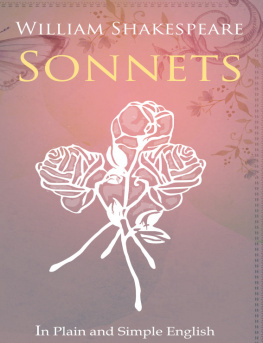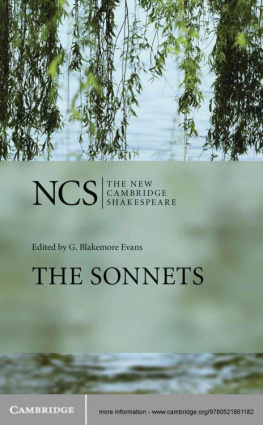William Shakespeares Sonnets In Plain and Simple English By BookCaps Study Guides 2011 by Golgotha Press, Inc. Published at SmashWords www.bookcaps.com
About This Series
The Classic Retold series started as a wayof telling classics for the modern readerbeing careful to preservethe themes and integrity of the original. Whether you want tounderstand Shakespeare a little more or are trying to get a bettergrasps of the Greek classics, there is a book waiting for you! The series is expanding every month. VisitBookCaps.com to see all the books in the series, and while you arethere join the Facebook page, so you are first to know when a newbook comes out.
Comparative Version
Sonnet I
From fairest creatures we desireincrease, That thereby beauty's rose might neverdie, But as the riper should by time decease, His tender heir might bear his memory: But thou, contracted to thine own brighteyes, Feed'st thy light'st flame withself-substantial fuel, Making a famine where abundance lies, Thyself thy foe, to thy sweet self toocruel. Thou that art now the world's freshornament And only herald to the gaudy spring, Within thine own bud buriest thy content And, tender churl, makest waste inniggarding.
Pity the world, or else this glutton be, To eat the world's due, by the grave andthee. We want beautiful people to reproduce, So their beauty will never die, And as the parent grows older and his looksdecrease, His beautiful child will bear the memory ofhis youth, But you, caught up with your own sparklingeyes, Feed upon your own beauty and burn itout, Making very little where a lot shouldbe. You are your own worst enemy and cruel inyour sweetness. You are, for the time being, a good lookingyoung person, and a messenger of the brilliance of springitself, But you keep your loveliness toyourself, Andyoung and ungraciousyou waste it byhoarding it. Take pity on the world or you will be seenas greedy, Having taken all of your beauty to the gravewith you.
Sonnet II
When forty winters shall beseige thybrow, And dig deep trenches in thy beauty'sfield, Thy youth's proud livery, so gazed onnow, Will be a tatter'd weed, of small worthheld: Then being ask'd where all thy beautylies, Where all the treasure of thy lustydays, To say, within thine own deep-sunkeneyes, Were an all-eating shame and thriftlesspraise.
How much more praise deserved thy beauty'suse, If thou couldst answer 'This fair child ofmine Shall sum my count and make my oldexcuse,' Proving his beauty by succession thine! This were to be new made when thou artold, And see thy blood warm when thou feel'st itcold. When forty years have overtaken yourbrow, And have dug deep wrinkles in its smoothbeauty, The proud costume of your youth viewednow, Will be a tattered weed that isworthless. And when you are asked where is yourbeauty What happened to the prize of your youngerdays? If you were to say its within your deepsunken eyes, It would be a shameful and uselesspraise. How much better if your beauty had beenspent having a child, So that you could answer This child ofmine Accounts for why I look so old. Your beauty would be passed on throughhim! This would make you appear new when you areold, And his blood would still be warm when yourscools.
Sonnet III
Look in thy glass, and tell the face thouviewest Now is the time that face should formanother; Whose fresh repair if now thou notrenewest, Thou dost beguile the world, unbless somemother.
For where is she so fair whose unear'dwomb Disdains the tillage of thy husbandry? Or who is he so fond will be the tomb Of his self-love, to stop posterity? Thou art thy mother's glass, and she inthee Calls back the lovely April of herprime: So thou through windows of thine age shallsee Despite of wrinkles this thy goldentime. But if thou live, remember'd not to be, Die single, and thine image dies withthee. Look in your mirror and tell the facelooking back at you That now is the time to bear a child withthe same face. Your face is fresh and young now, but if youdont regenerate it You will cheat the world and deprive amother. Who out there is so beautiful that herwomb Would refuse to take the seed of yourchild? And who is so foolish that he will be thedeath, Due to his self-obsession, of his own lineof descendants? Your own face is your mothers mirror, andshe sees in it The lovely springtime of her youth. You will also be able to look back in yourold age And see your youth in your childs facedespite your wrinkles.
But if you live without having children, youwill not be remembered. You will die alone, and your image will diewith you.
Sonnet IV
Unthrifty loveliness, why dost thou spend Upon thyself thy beauty's legacy? Nature's bequest gives nothing but dothlend, And being frank she lends to those arefree. Then, beauteous niggard, why dost thouabuse The bounteous largess given thee togive? Profitless usurer, why dost thou use So great a sum of sums, yet canst notlive? For having traffic with thyself alone, Thou of thyself thy sweet self dostdeceive. Then how, when nature calls thee to begone, What acceptable audit canst thou leave? Thy unused beauty must be tomb'd withthee, Which, used, lives th' executor to be. Wasteful beautiful person, why do youspend All of your beauty on yourself? Nature gives nothing but she lends alot, And, being generous, she lends most to thosewho are carefree.
So, you miserly hoarder, why do youabuse The open-hearted gift given to you? You make no profit, so why do you use So much of your gift when you cant live onforever? Your dealings are with yourself alone, And only you alone receive the sweet gift ofyourself. When nature calls you to die, What account of your life will you leavebehind? Your unused beauty will go to the grave withyou, And, if it had been used, it could carryon.
Sonnet V
Those hours, that with gentle work didframe The lovely gaze where every eye dothdwell, Will play the tyrants to the very same And that unfair which fairly doth excel: For never-resting time leads summer on To hideous winter and confounds himthere; Sap cheque'd with frost and lusty leavesquite gone, Beauty o'ersnow'd and bareness everywhere: Then, were not summer's distillationleft, A liquid prisoner pent in walls ofglass, Beauty's effect with beauty were bereft, Nor it nor no remembrance what it was: But flowers distill'd though they withwinter meet, Leese but their show; their substance stilllives sweet. The same process of time that gently worksto create The beauty of the face that holds everyonesgaze, Will do cruel work to the same face And make it ugly even though it is now sobeautiful. Time never rests and it leads summer on Into frightful winter and destroys itthere, Freezing its sap and taking away itsvigourous leaves, Covering it over with snow and barenesseverywhere. If summers essence had not been leftbehind As a liquid perfume contained in glass, There would be nothing left of itsbeauty, And no memory of what it had been.
But flowers made into perfume before winterarrives, Lose only their appearance: their sweetscent remains.
Sonnet VI
Then let not winter's ragged hand deface In thee thy summer, ere thou bedistill'd: Make sweet some vial; treasure thou someplace With beauty's treasure, ere it beself-kill'd. That use is not forbidden usury, Which happies those that pay the willingloan; That's for thyself to breed anotherthee, Or ten times happier, be it ten for one; Ten times thyself were happier than thouart, If ten of thine ten times refiguredthee: Then what could death do, if thou shouldstdepart, Leaving thee living in posterity? Be not self-will'd, for thou art much toofair To be death's conquest and make worms thineheir. Dont allow winters rough hand todisfigure The summer beauty in you before it isdistilled Make it into something sweet that can becontained Like a treasure before you ruin it. It is not a forbidden use of interest A willing woman would be happy to repay theloan And produce a child for you, Or ten times happier, if there were tenchildren. You yourself would be ten times happier If you had ten children who looked likeyou.
Next page











